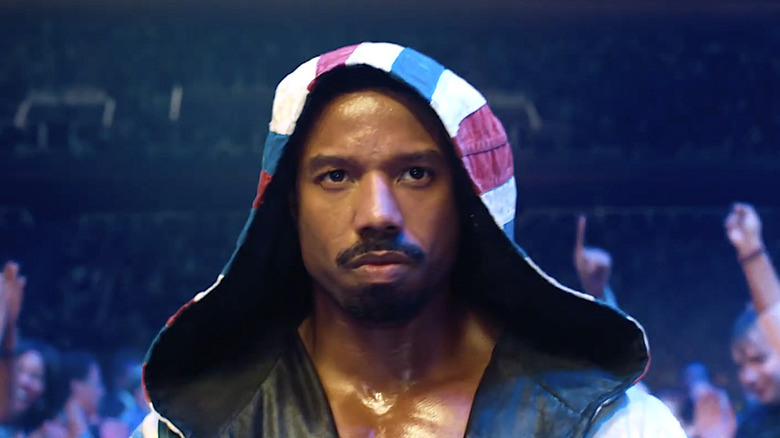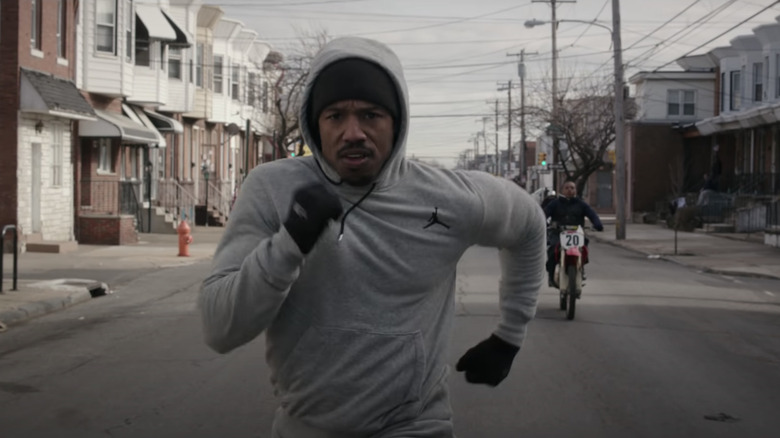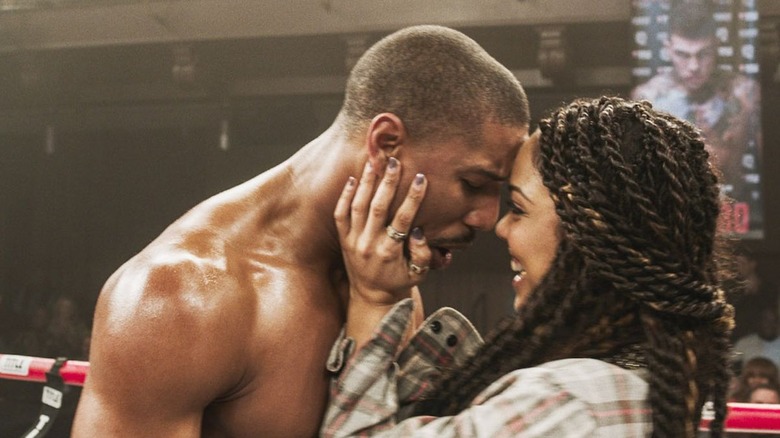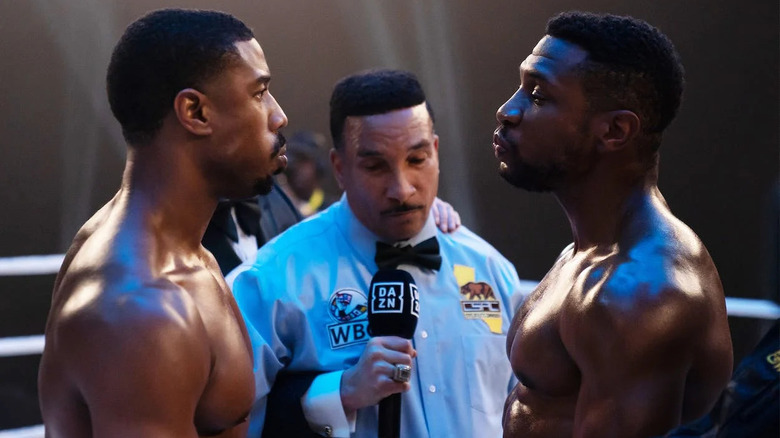Creed Is The Ideal Blueprint For The Modern Non-Superhero Franchise
Just as Adonis Creed (Michael B. Jordan) has stepped out of the shadow of his father Apollo (Carl Weathers) and mentor Rocky Balboa (Sylvester Stallone), "Creed" now stands on its own two legs as a franchise. The first film, where Adonis sought out Rocky to train him, followed a formula that's become known as a "legacy sequel" — hit the beats of the original and mix old characters with new ones filling familiar archetypes.
The thing about legacy sequels is they tend to be more legacy, less sequel. The old stars usually overshadow the new ones, who fail to leave an impression. But not this time. The endurance of "Creed" is even more remarkable given the different fundamentals it operates on compared to contemporary film franchises.
The most consistently successful are superheroes (and on a smaller scale, horror). "Creed," though, is about sports. The "Rocky" series certainly got outlandish, while the introduction of Adonis' childhood friend-turned-rival Damian Anderson (Jonathan Majors) in "Creed III" feels soap opera-ish (or, alternatively, right out of Shōnen Jump). However, the characters and settings are still confined to reality. Boxers may push themselves beyond their physical limits, but their feats still look like small potatoes compared to one of the Avengers.
Likewise, while successful in its own right, no "Creed" movie has taken in a Marvel Studios-level box office haul. Yet, through their smaller-scale success, these movies are proof that there's an opening for smaller-scale franchises.
Icons and the stars playing them
The binding glue of a movie franchise has changed from 1976 (when "Rocky" was released) to 2015 (when "Creed" was). Before the turn of the millennium, audiences went to the movies for the stars, like Sylvester Stallone himself or his rival Arnold Schwarzenegger. If an actor was the lead in a hit, studios would greenlight star vehicles for that actor, not spin-offs about supporting characters from that hit. As Mike D'Angelo wrote at The A.V. Club in 2013, "Movie stars were our superheroes [in the 20th century.]"
Now things are different. Think about the franchises that do thrive, superheroes and horror, and what they have in common: immediately recognizable characters. It's not the actors people go to see so much as the characters they're playing. Audiences turn out for Batman movies no matter if it's Ben Affleck, Michael Keaton, or Robert Pattinson behind the cowl. In another of these mediums blurring lines, movie franchises now have the same appeal as television — you get to spend time with characters you enjoy watching.
Rocky Balboa is a recognizable character, but he's inextricable from Stallone. Adonis Creed is the same mold. A mix of pathos, Michael B. Jordan's charisma, and good old-fashioned underdog relatability let him win audiences' hearts. People came to "Creed" for Rocky, but they're coming back to this world for Adonis and to see him beat the odds again and again.
Character and formula alike
The characters in "Creed" aren't saving the world, so the stakes have to be more personal. In the climax of "Creed," a beaten down Adonis begs Rocky to let him back in the ring against "Pretty Ricky" Conlan (Tony Bellew). Why is he so insistent? Because he has to live up to his father's legacy and "prove [...he's] not a mistake." "Creed II" definitely leans too hard on nostalgia, but it furthers the lives of Adonis and Bianca (Tessa Thompson). They become parents and their daughter, Amara, inherits her mother's deafness.
In "Creed III," boxing is more than just a competition, it's two former friends coming to blows. While the two spend the climax punching each other, this is the culmination of dialogue-driven moments. Indeed, the film can't be more explicit that "Donnie" and "Dame" need to talk their issues out to resolve them.
Due to this attention to characters and Michael B. Jordan's performance, audiences like Adonis and want to follow his story across sequels. Not to say these stories will be groundbreaking. "Rocky" pioneered a boxing movie formula and even with Sylvester Stallone's absence in Part III, "Creed" hasn't broken it. Formulas can be artistically limiting, but the fact is, audiences enjoy the familiar.
This is one area where these franchises overlap — you know the beats to expect before seeing a Marvel movie, just like you know them in a "Rocky" or "Creed" movie. However, the latter's characters are more fallible. The blows that Adonis takes and gives look like they hurt more than any fight the Avengers are in. While superheroes will always triumph, mortals like Adonis can be backed up against the ropes before coming out strong. Seeing those triumphs time after time is what keeps audiences hooked as the "Creed" saga continues.
Lessons to learn
A story is only as good as its villain. Jonathan Majors isn't in multiplexes only as Damian right now — he's the best part of "Ant-Man and the Wasp: Quantumania" as Kang the Conqueror. In that film, Kang's motives are nebulous, involving abstract ideas like alternate timelines and world domination. Damian's drive in "Creed III" is simpler — he thinks got his chance stolen from him and he should be living the life Adonis leads. Even if you've never walked in Damian's exact shoes, envy towards someone you once called a friend is, regrettably, something most people can relate to.
At /Film, we have written about how increasingly, the Marvel Cinematic Universe seems devoid of any connection to the real world. With the Avengers hovering above humanity like gods on Olympus and mere mortals nowhere in sight, there's room for franchises like "Creed" that are driven by human (melo)drama. If more franchises emerge about people, not the costumes they're wearing, then a new generation of movie stars — of the caliber of Majors, Michael B. Jordan, and Tessa Thompson — could follow.



